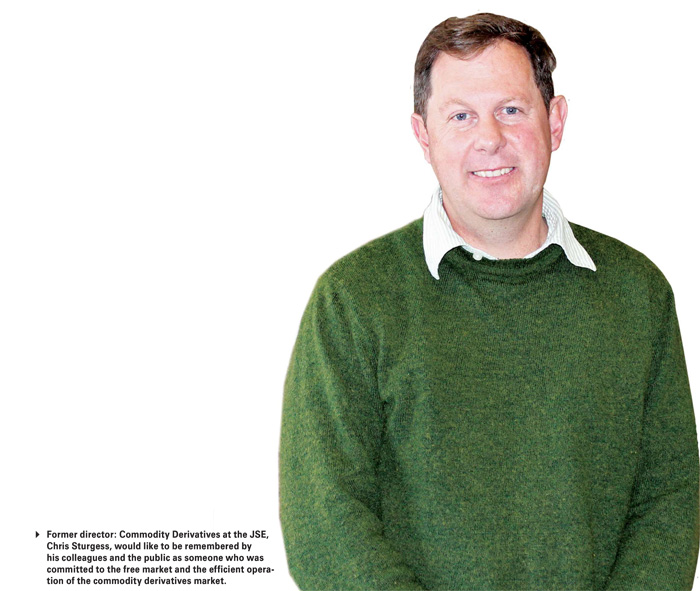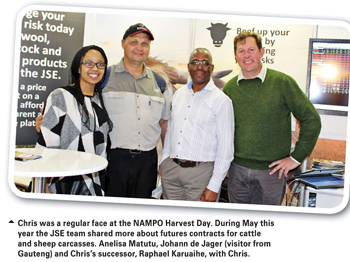September 2017
After nearly 20 years at Safex, Mr Chris Sturgess (44) former director: Commodity Derivatives at the JSE, handed over the reins to Mr Raphael Karuaihe at the end of June this year. About this decision to move on, he says the following, ‘There comes a time when you need to move on to allow others to have as much fun as you did.’
He admits that his decision to step down was made easier by his team that could easily step up and take over the reins. His successor, Karuaihe, has been on board for the past five years and has been mentored by Sturgess. Other star team members are Mss Anelisa Matutu (specialist: Commodities) who was part of the graduate programme at the JSE and Mr Vuyo Mpumza (intern), the most recent recruit.

A career at Safex
Sturgess grew up on a small farm just outside Middelburg, Mpumalanga. After completing his school career, he obtained a bachelor’s degree in agricultural management (with economics as main subject), at the University of KwaZulu-Natal. He had always appreciated the true trials and tribulations that come with farming and found this degree to be a well-rounded course in agriculture.
He travelled and worked abroad for a year before returning to the family farm. After a season harvesting the potato and maize crops he heard about an opportunity to join Safex. Although it was not well established at that time, he met with Mr Rod Gravelet-Blondin (previous senior general manager: Commodity Derivatives, JSE) and realised this was an opportunity of a lifetime.
‘Either it was going to work and we would be pioneers establishing the agricultural derivatives market in South Africa, or it would not take off at all.’
Although they were a small team, he started out at the bottom and at the age of 24 was happy to do anything to ensure he remained involved. He was able to market to and educate not only producers and millers, but anyone interested in understanding how to use futures contracts to manage price risk.
To him highlights of his career include the first million contracts traded, the opportunity to be directly involved in every new product launched since inception, except for the white and yellow maize contracts, the agreement with the CME Group to allow South Africa to trade their products and the opportunity to cross paths with a variety of South Africans.
‘Regarding the challenges, it is never fun dealing with market regulation cases of market abuse by clients of registered traders, but the reality is they do happen,’ he says and adds with a smile, ‘And then, when there are any technical issues with the system, you know you are under pressure!’
Although he did not receive any special accolades, he got to be part of a group of individuals committed to building the only commodity derivatives exchange on the continent to be globally recognised for its success.
‘One can never be sure of your career path when you start out. However, through your own enthusiasm and commitment to work at things, a person can be part of something very special.’
He enjoyed interacting with the diverse set of people from across the agricultural sector and says these interactions taught him to listen to other opinions and views, but at the end of the day to strive to what would be the best for the success of the derivatives market in South Africa.
 Life after the JSE
Life after the JSE
Sturgess will continue his relationship with the JSE on a consultancy basis to work on some of the new products like wool and lamb as well as the Zambian derivative contracts which will be a first to be traded and settled in US dollars. Although his interaction with the JSE will continue on a regular basis, he now gets to spend time away from the hustle and bustle of city life, by having relocated to the Garden Route.
He and his wife, Jenny, whom he met at a guesthouse during one of his numerous visits to the NAMPO Harvest Day, are venturing into the hospitality industry. They have purchased a guest farm in the Plettenberg Bay area.
‘I would not say it was part of a lifelong dream, but it gives us the opportunity to raise our two sons, Mark (10) and Luke (8), out in the countryside. It is an added bonus that we get to stay close to the beach and mountains,’ he shares enthusiastically about this lifestyle change.
Six questions to an industry leader
How does the South African commodity trading platform compare internationally?
‘South Africa is globally recognised for the success we saw in moving from a regulated to a free market. With the success in liquidity we have been able to attract setting up the derivatives market in South Africa to such a degree that this was confirmed independently by a study done by the United Nations Conference on Trade and Development (UNCTAD) some years back. The success of the exchange can be attributed mainly to the support and commitment from our members and clearing members, the solid banking system we have in South Africa, the robust support and integrity of storage operators to guarantee products on silo receipts and then of course committed people.’
There have always been rumours about the possibility for market manipulation within the futures exchange system. In your opinion, is there any truth to these rumours?
‘The dedicated resources at the JSE that solely focus on market regulation matters and the efforts of the Financial Services Board’s directorate of market abuse must not be forgotten. Both these teams work hard to ensure any market abuse is identified and penalised accordingly. We have a clear set of cases that the FSB have processed and those that were found guilty of market abuse were penalised. This area remains a very important one for the JSE and for the integrity of the market place. Clients who feel they have a theory around market abuse should rather contact the JSE’s regulation department. They have access to all the derivatives data and can accurately investigate any abuse claims.’
Location differentials have been a contentious topic in the agricultural industry. Is it justified and what are the producers’ biggest misconception about it?
‘I think grain producers are fully aware of my opinions around this as we have discussed this subject on many a platform. My views remain the same: The location differential model is well justified for the derivatives market. Producers should rather pay more careful attention to the spot basis contract we have in place for access to any basis premiums.’
Is there a place in the future of the soft commodity trading environment for alternative exchanges that can become competitors to Safex?
‘When you look at any exchange that is successful, you see they have managed to attract liquidity and so it is easy to enter or exit positions on the exchange. I am not 100% sure the existing JSE Commodity Derivatives market has really achieved that perfect liquidity state. Earlier this year we were down 26% on contracts traded, so during this period daily liquidity on most of our contracts would have been lower. The big question is would another commodity derivatives exchange in South Africa add to more liquidity or simply split it? At the end of the day we only have so much underlying grain to trade. Obviously, nothing prevents a competitor from starting up. I just have my concerns around the potential liquidity impact.’
What can South African grain producers do to become more competitive with their international peers?
‘I have always had the view that our grain producers are already very competitive and best of breed. Just look how they have managed to increase yields and adopt the latest technologies. What we did see in the early days of the derivatives business in South Africa, is many would be speculators on the market. Over the years more have turned to only use the market as hedgers, which obviously is a more conservative but sustainable use of the derivatives market instruments. I take my hat off and salute the grain producers of this country!’
How do you see the future of agriculture in South Africa and what is your message to South African producers?
‘This question is very similar to the one often asked around where prices will go: We know prices will go up and will go down, I am just not sure in what order, though. On a more serious note, I appreciate there will be good times and tough times for any industry participant, but we should never forget why we do things. Farming is in your blood – it is your passion. Make sure you are familiar with the instruments around you that can reduce your risks – just to be clear, the JSE market can assist you with your price risk.
‘I am an optimistic person by nature and remain optimistic that South Africa and even select countries to the north of us will continue to evolve and become even stronger grain producers. It has been a special journey for me and a privilege to have interacted with so many different grain producers, often organised through Grain SA. The conversations have always been robust, often tense, but I can say we have always maintained our respect for each other. For that, I can only say, thank you.’
Publication: September 2017
Section: Relevant